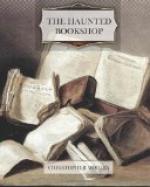“I’ve come to lunch with you, and borrow enough money to get home with.”
“On Monday?” cried the other. “Tuesday being the day of stipend in these quarters? Nay, say not so!”
They lunched together at a quiet Italian restaurant, and Aubrey narrated tersely the adventures of the past few days. The newspaper man smoked pensively when the story was concluded.
“I’d like to see the girl,” he said. “Tambo, your tale hath the ring of sincerity. It is full of sound and fury, but it signifieth something. You say your man is a second-hand bookseller?”
“Yes.”
“Then I know where you’ll find him.”
“Nonsense!”
“It’s worth trying. Go up to Leary’s,
9 South Ninth.
It’s right on this street. I’ll
show you.”
“Let’s go,” said Aubrey promptly.
“Not only that,” said the other, “but I’ll lend you my last V. Not for your sake, but on behalf of the girl. Just mention my name to her, will you?
“Right up the block,” he pointed as they reached Chestnut Street. “No, I won’t come with you, Wilson’s speaking to Congress to-day, and there’s big stuff coming over the wire. So long, old man. Invite me to the wedding!”
Aubrey had no idea what Leary’s was, and rather expected it to be a tavern of some sort. When he reached the place, however, he saw why his friend had suggested it as a likely lurking ground for Roger. It would be as impossible for any bibliophile to pass this famous second-hand bookstore as for a woman to go by a wedding party without trying to see the bride. Although it was a bleak day, and a snell wind blew down the street, the pavement counters were lined with people turning over disordered piles of volumes. Within, he could see a vista of white shelves, and the many-coloured tapestry of bindings stretching far away to the rear of the building.
He entered eagerly, and looked about. The shop was comfortably busy, with a number of people browsing. They seemed normal enough from behind, but in their eyes he detected the wild, peering glitter of the bibliomaniac. Here and there stood members of the staff. Upon their features Aubrey discerned the placid and philosophic tranquillity which he associated with second-hand booksellers— all save Mifflin.
He paced through the narrow aisles, scanning the blissful throng of seekers. He went down to the educational department in the basement, up to the medical books in the gallery, even back to the sections of Drama and Pennsylvania History in the raised quarterdeck at the rear. There was no trace of Roger.
At a desk under the stairway he saw a lean, studious, and kindly-looking bibliosoph, who was poring over an immense catalogue. An idea struck him.
“Have you a copy of Carlyle’s Letters and Speeches of Oliver Cromwell?” he asked.
The other looked up.
“I’m afraid we haven’t,” he said. “Another gentleman was in here asking for it just a few minutes ago.”




